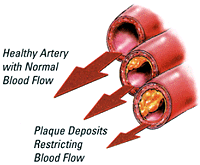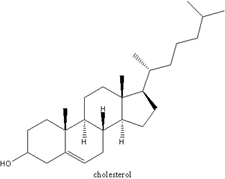Cholesterol and Triglycerides Regimen
Summary: Follow The Zone Diet and the General Maintenance Regimen. If more action is needed short term, use FutureBiotics Cholesta-Lo and a proline lysine vitamin C combination like Source Naturals Proline Lysine combination.
Many times, using the Zone Diet is all that is necessary. It is also good to provide all the nutrients the body needs to effect good systemic nutritional stores by following the General Maintenace regimen, using a multivitamin, multimineral, and essential fatty acid supplement, but if it is desired to use only one product, make it the FurtureBiotic Cholesta-Lo, the most cost-effective combination supplement.
The fact that carb-limited diets are the most effective to reduce bad LDL and raise good HDL levels give lie to the conventional views on serum cholesterol levels. It's *not* the eggs and butter, it's the sugar and wheat!
complementary supplements made to fight high serum levels of cholesterol and triglycerides, like Cholesta-Lo, typically clean the liver, improve its function, and provide antioxidants instead of destroying the liver like conventional medications. The Zone Diet will work by itself, but results can take up to a month. Using nutritional supplements will usually speed things up.
If there is known existing arterial plaque or severe cholesterol levels, or to speed the effects of the above supplement, add to this regimen a lysine vitamin C combination. Pantethine (like Enzymatic Therapy Cholestoril), a derivative of pantothenic acid, can yield good results by itself, as can red yeast rice extract, but these are not as effective as the Cholesta-Lo combination and quite a bit more expensive. They can be added to the regimen if extra action is needed, though.
 I have seen someone do Atkins'
Diet as the only therapy and drop one hundred points in LDL (bad
serum cholesterol) in one month, while also dropping serum triglycerides
and increasing HDL (good cholesterol) levels a great deal. It involves
eating all the protein and oils one wants (including butter, cheese, meat, eggs,
etc) while strictly limiting starchy carbohydrates and sugar. Although I don't
generally recommend the Atkins' diet, it is the fastest way to improve
cholesterol and triglyceride levels. The Zone, with its moderate levels of protein, oils, and carbs, also works. It takes a
couple of weeks longer for results but is a far better long term diet for most people.
I have seen someone do Atkins'
Diet as the only therapy and drop one hundred points in LDL (bad
serum cholesterol) in one month, while also dropping serum triglycerides
and increasing HDL (good cholesterol) levels a great deal. It involves
eating all the protein and oils one wants (including butter, cheese, meat, eggs,
etc) while strictly limiting starchy carbohydrates and sugar. Although I don't
generally recommend the Atkins' diet, it is the fastest way to improve
cholesterol and triglyceride levels. The Zone, with its moderate levels of protein, oils, and carbs, also works. It takes a
couple of weeks longer for results but is a far better long term diet for most people.
When cooking foods with high heat, it is far better to use a saturated fat like coconut oil, ghee, or lard that is undamaged by heat rather than one that produces artery-clogging trans fats like most vegetable oils.
At one time, movie theaters and restaurants used safe saturated fats to fry their foods but under pressure from the conventional medical establishment and other scientists, changed to the damaged, unhealthy types of oils. Was this criminal conspiracy to purposely create heart disease, or mere incompetence?
A complementary health wonk once joked that the best way to stay healthy is to go to an MD and ask for his or her advice, then do exactly the opposite. In a few cases, this is pretty accurate.
Carb limited diets like these which are the most effective to reduce LDL and raise HDL levels give lie to the conventional views on serum cholesterol levels. It's *not* the eggs and butter, it's the sugar and wheat! I have never seen anyone who started eating two eggs a day (boiled, or cooked in an undamaged oil like butter) whose cholesterol levels did not improve. The amount of cholesterol that foods contain is generally irrelevant to serum cholesterol levels. The nutrients in eggs (lecithin, protein, B vitamins, minerals) provide building blocks for a healthy circulatory system as well as nourish the liver. Butter provides butyric acid, lauric acid, conjugated linoleic acid, trace minerals like selenium, and other useful nutrients, so is also helpful. It *is* important to avoid trans fats (foods fried in non-saturated vegetable oil) and hydrogenated oils (margarine and most processed foods that contain fat) which do "clog the arteries," but healthy oils improve the function of the liver and lower cholesterol levels. Using a tablespoon of extra virgin olive oil before bed can yield amazing results in a short time for some people due to the nutrients it contains as well as the oil itself, which stimulates the liver. See Fats and Oils for more information.
Sometimes, all that is needed to control cholesterol levels is to provide
basic nutrients with some added
antioxidants. Getting 100% RDA or more of magnesium may be the most
important factor followed by a good amount of B vitamins. See General Maintenance
Regimen. This  can take a long time, like a couple of months,
before results are noticed, but is probably the best to do long term.
can take a long time, like a couple of months,
before results are noticed, but is probably the best to do long term.
When any tissue is weak, the body will typically compensate by making more of it. In blood vessels, cholesterol and other fatty deposits are used to add thickness to the vessel walls. This is going for short-term damage control of preventing the vessels from bursting from being too weak to contain the pressure, at the expense of the long-term detriment of clogging the vessels with these deposits and making the heart work harder. Clogged vessels are therefore one symptom of nutrient deficiency of too little good oils, protein, antioxidants, and nutrients, or too many bad oils (which cause weak building blocks for tissues). Destroying the liver with toxic drugs to inhibit its proper function of providing fat and cholesterol to repair weak vessels is not recommended by those who understand basic nutrition and physiology.
Conventional Cholesterol Meds 2001 Note: Many suspected that conventional cholesterol drugs would not improve the rate against heart attacks and other coronary episodes, which is what they are ultimately supposed to do by controlling cholesterol and triglyceride levels. A recent ad campaign by a pharmaceutical company stated that its new cholesterol medication is the first which actually decreased the rate of coronary events. I don't know if they do this by adding an antioxidant, mineral, or other sensible ingredient to their drug. But, the ad was yanked quickly. I would guess that this was to keep people from wondering if the cholesterol medication they were currently taking was not improving the risk ofcoronary problems. 2004 Note: Some suspect that taking statin drugs may actually increase the risk of a coronary event by robbing the body of CoQ10. If I were clueless enough to take a statin drug for cholesterol, I would at least try to minimize the damage by using a CoQ10 supplement along with it. Further to Statins and Vitamin D Deficiency - Another Blow... "In patients with CHF(Chronic Heart Disease), lower serum total cholesterol is independently associated with a worse prognosis." Increasing the probability of congestive failure due to CQ10 deficiency created from Statins was not enough now we see that lowering cholesterol, the very thing that these cash cow drugs are literally designed to do can also cause congestive failure. Yet millions upon millions are scared shit less everyday into taking these - why? That is downright significant and this work was published mid 2003 yet has been completely overlooked as are the major side effects from Statins. With so much accumulated data one can only charge the medical profession of gross negligence. The cholesterol myth is so well cultivated and easy to manage by the well funded pharma industry that those who continue to trust/depend on this largely corrupt system will continue to be injured. It not only pays to think for oneself and manage one's own health - as the system is designed to manage sickness or should I say create and then manage sickness all under the pretense of health! Chris Gupta "RESULTS: In the derivation study, survival at 12 months was 78% (95% confidence interval [CI] 70% to 86%) and 56% (95% CI 51% to 62%) at 36 months. Increasing total serum cholesterol was a predictor of survival (hazard ratio 0.64, 95% CI 0.48 to 0.86), independent of the etiology of CHF, age, left ventricular ejection fraction, and exercise capacity. Receiver-operating characteristic curves demonstrated a best cut-off value of =5.2 mmol/l (200.8 mg/dl) as being the best predictor of mortality at 12 months (sensitivity 80.0%, specificity 62.9%). In the validation population, one-year survival was 88% (95% CI 84 to 91%) and three-year survival was 68% (95% CI 63 to 73%). The chance of survival increased 25% for each mmol/l increment in total cholesterol. Survival rates above and below the cut-off value for cholesterol in patients with ischemic heart disease (n = 181) were 92% (95% CI 89 to 94) versus 75% (95% CI 64 to 85%) at one year and 72% (95% CI 67 to 76%) versus 50% (95% CI 43 to 56%) at three years. CONCLUSIONS: In patients with CHF, lower serum total cholesterol is independently associated with a worse prognosis". Bad News About Statin Drugs (this post contains the comprehensive list of links on this topic) --------- "All you have to do is drink cranberry juice. A study on a group of at-risk men (i.e., men with excess abdominal fat) found that just eight ounces of cranberry juice each day improved the hard to raise HDL by 8.6%. More juice was not necessarily more effective." "A low HDL-cholesterol concentration is an independent risk factor for CVD. Studies have suggested that flavonoid consumption may be cardioprotective, and a favourable impact on circulating HDL-cholesterol concentrations has been suggested to partially explain this association. The aim of the present study was to determine the effect of consuming increasing daily doses of low-calorie cranberry juice cocktail (CJC) on the plasma lipid profile of abdominally obese men. For that purpose, thirty men (mean age 51 (SD 10) years) consumed increasing doses of CJC during three successive periods of 4 weeks (125 ml/d, 250 ml/d, 500 ml/d). Before the study and after each phase, we measured changes in physical and metabolic variables. We noted a significant increase in plasma HDL-cholesterol concentration after the consumption of 250 ml CJC/d (+8.6+/-14.0% v. 0 ml CJC/d; P<0.01), an effect that plateaued during the last phase of the study (500 ml CJC/d: |